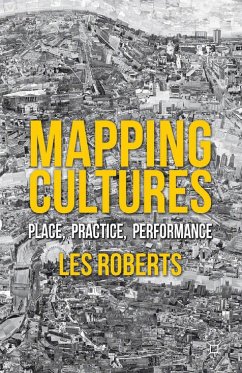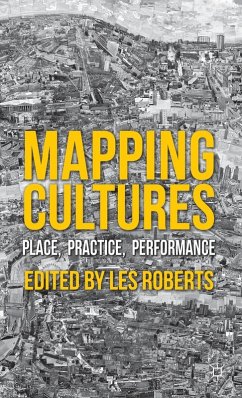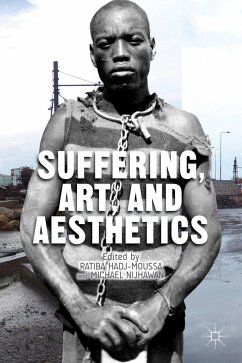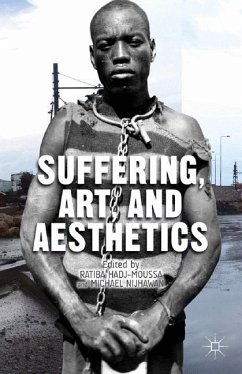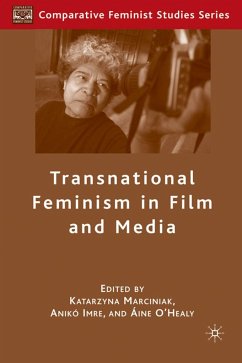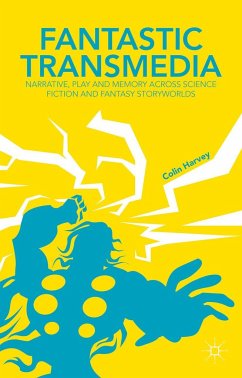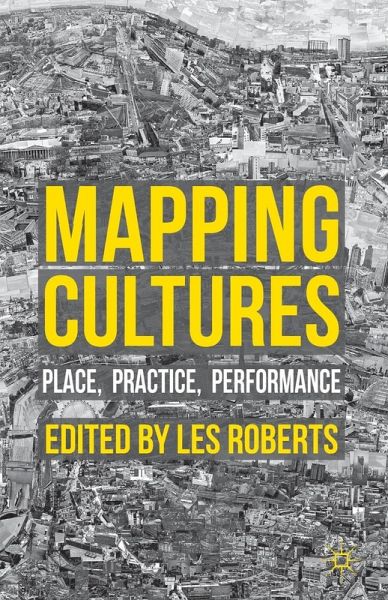
Broschiertes Buch
Mapping Cultures
Place, Practice, Performance
Herausgegeben: Roberts, Les
Versandkostenfrei!
Versandfertig in 6-10 Tagen

PAYBACK Punkte
15 °P sammeln!





An interdisciplinary collection exploring the practices and cultures of mapping in the arts, humanities and social sciences. It features contributions from scholars in critical cartography, social anthropology, film and cultural studies, literary studies, art and visual culture, marketing, museum studies, architecture, and popular music studies.
HAZEL ANDREWS Senior Lecturer in Tourism, Culture and Society at Liverpool John Moores University, UK LAWRENCE CASSIDY Founder of the Streets Museum project, UK SARA COHEN Professor at the School of Music, University of Liverpool, and Director of the Institute of Popular Music, UK JEZ COLLINS Member of the Birmingham Centre for Media and Cultural Research at Birmingham City University, UK DAVID COOPER Lecturer in English Literature at the University of Cumbria and Research Fellow on the European Research Council-funded project, 'Defining Spatial Humanities', at Lancaster University, UK MARTIN DODGE Senior Lecturer in Human Geography, Manchester University, UK PAUL LONG Reader in Media and Cultural History, and Associate Director, Birmingham Centre for Media and Cultural Research at Birmingham City University, UK RICHARD MISEK Lecturer in digital media at the University of Kent, UK SIMONETTA MORO teaches at Eugene Lang College, The New School for Liberal Arts, New York, USA CHRIS PERKINS Senior Lecturer in Geography and emeritus University Map Curator, University of Manchester, UK CHRIS SPEED Reader in Digital Spaces across the Schools of Architecture and Landscape Architecture at the University of Edinburgh, UK GARY WARNABY Reader in Marketing at the University of Liverpool Management School, UK DENIS WOOD Independent scholar living in Raleigh, North Carolina, USA EFRAT BEN-ZE'EV teaches anthropology at the Department of Behavioural Sciences, the Ruppin AcademicCenter, Israel and is a fellow of the Harry S. Truman Research Institute for the Advancement of Peace at the Hebrew University of Jerusalem
Produktdetails
- Verlag: Palgrave Macmillan / Palgrave Macmillan UK / Springer Palgrave Macmillan
- Artikelnr. des Verlages: 978-1-137-53395-1
- 2012
- Seitenzahl: 309
- Erscheinungstermin: 29. Mai 2012
- Englisch
- Abmessung: 216mm x 140mm x 18mm
- Gewicht: 438g
- ISBN-13: 9781137533951
- ISBN-10: 1137533951
- Artikelnr.: 42457299
Herstellerkennzeichnung
Libri GmbH
Europaallee 1
36244 Bad Hersfeld
gpsr@libri.de
"This collection gives a widely spread voice to the widening acknowledgement of what maps mean and do; how and where they occur. Comprising a series of related but distinctive, lively, well worked and critically engaging chapters, the book will find readers across a range of disciplines and subjects." - David Crouch, University of Derby, UK
"Mapping Cultures offers a collection of innovative studies and theoretical essays, each confronting the diffusion of cartographic method and rhetoric throughout humanities and social science research over the past two decades. . . . [the book] is brimming with insight into the emergent mapping practices and vocabularies by which we might better resist authoritarian, anti-democratic practices,
"Mapping Cultures offers a collection of innovative studies and theoretical essays, each confronting the diffusion of cartographic method and rhetoric throughout humanities and social science research over the past two decades. . . . [the book] is brimming with insight into the emergent mapping practices and vocabularies by which we might better resist authoritarian, anti-democratic practices,
Mehr anzeigen
which themselves do work through mapping. And it helps clear a path by which researchers in the humanities and social sciences alike might better understand and express that ''it is not so much what people do with maps as it is what maps do with people'' (Wood, p. 300). For this alone, the book is an important bridge between the relatively recent innovations of critical cartography, in particular, and a host of other fields just as recently innovated by the methods and metaphors of cartography in general." - Cartographica 48 (2), 2013.
"The book closes with a call for a more explicit critical reorientation towards mapping, and map use a project of the anthropology of cartography (D. Wood). This call seems to be still valid andone can admit that Mapping Cultures is a significant step towards achieving the goal. Readers from different disciplines will find valuable contributions both theoretical and empirical in the collection. For a tourism researcher or student, the book is thought-provoking for several reasons, not only because of the enhancing awareness of cartography in relation to areas such as cinema, music, travel..." - Tourism, Culture and Communication 12, 2013.
"The book closes with a call for a more explicit critical reorientation towards mapping, and map use a project of the anthropology of cartography (D. Wood). This call seems to be still valid andone can admit that Mapping Cultures is a significant step towards achieving the goal. Readers from different disciplines will find valuable contributions both theoretical and empirical in the collection. For a tourism researcher or student, the book is thought-provoking for several reasons, not only because of the enhancing awareness of cartography in relation to areas such as cinema, music, travel..." - Tourism, Culture and Communication 12, 2013.
Schließen
Für dieses Produkt wurde noch keine Bewertung abgegeben. Wir würden uns sehr freuen, wenn du die erste Bewertung schreibst!
Eine Bewertung schreiben
Eine Bewertung schreiben
Andere Kunden interessierten sich für


